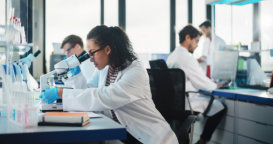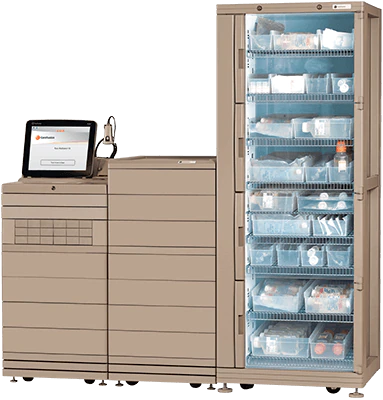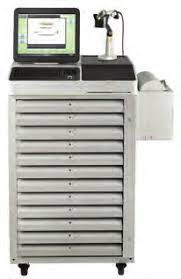
Advanced Pharmacy Technician III - Hybrid
Course Overview
Pharmacy Technician III
A pharmacy technician III is a medical professional who has completed all the pharmacy technician I and II requirements and advances to the higher levels of study. A pharmacy technician III is typically the highest level of certification in the career path and requires more experience and training. Pharmacy tech III positions typically require a minimum of six months to one year as a pharmacy technician and up to three to five years of experience performing more advanced duties than pharmacy technician I or II. This might include light management duties or other duties as requested by the pharmacist.
The Pharmacy Technician program at MTINY provides students with the technical and practical training necessary to work as an Intermediate-level assistant to a licensed pharmacist.
Students will study pharmacy computing, medication preparation, inventory and billing, quarterly customer service care. The program seeks to prepare students to work under a licensed pharmacist’s supervision in the preparation and dispensing of medications, maintaining patient records, setting up, packaging, and labeling routine orders from stock supplies, and mixing drugs with parenteral fluids.
The core curriculum is structured to include a lecture component, a laboratory component, and an Internship component. The final externship portion of the curriculum consists of supervised experiences in a clinical environment, which requires competencies, logs, and evaluations completed by the student.
At the conclusion of the program, graduates who have diligently attended class and their externship and studied and practiced their Sterile Compounding skills should have the skills to seek employment as Advanced Pharmacy Technician III.
Tuition & Fees
Course overview
We are still updating our website with contents. Please check back next time.
Program Schedule
SPRING SCHEDULE*
Start Date: 3/12/2025
Expected Graduation Date: 1/12/2026
SUMMER SCHEDULE*
Start Date: 6/4/2025
Expected Graduation Date: 4/8/2026
*Orientation will be held approximately one week prior to the start of the program.
MTI Mission & Goals
The mission of MTI of New York is to offer education in Allied Health for on-demand occupations to members of our community in pursuit of advancing their career path in this employment sector. As such, MTI strives to deliver to its community of learners, opportunities for career advancement, change and expanding industry standards, the optimum delivery of services, which meet and exceed industry expectations, to place graduates at the top of the candidacy pool for positions within their area of choice.
Program Curriculum
| Course Code | Course Title | Hours |
|---|---|---|
| APT101 | Personal/Interpersonal Knowledge and Skills | 10 |
| APT102 | Foundational Professional Knowledge and Skills | 10 |
| APT103 | Processing and Handling of Medications and Medication Orders | 10 |
| APT104 | Sterile and Non-Sterile Compounding | 80 |
| APT105 | Procurement, Billing, Reimbursement and Inventory Management | 10 |
| APT106 | Patient Care, Quality and Safety Knowledge and Skills | 10 |
| APT107 | Patient- and Medication-Safety | 10 |
| APT108 | Pharmacy Internship I: Community Practice Settings | 150 |
| APT109 | Technology and Informatics | 40 |
| APT110 | Automation (Pyxis and Omnicell Machine) Field Service Technician | 40 |
| APT111 | Regulatory and Compliance Knowledge and Skills | 10 |
| APT112 | Regulatory Issues | 10 |
| APT113 | Quality Assurance | 10 |
| APT114 | Pharmacy Internship II: Nontraditional Pharmacy Practice | 100 |
| APT115 | Current and Expanding Role of the Pharmacy Technician | 10 |
| APT116 | Leadership and Management Skills | 10 |
| APT117 | Communication Within the Interdisciplinary Team | 10 |
| APT118 | Operational Functions | 20 |
| APT119 | Technology and Dispensing Systems | 40 |
| APT120 | Advanced Clinical Skills in Community and Institutional Settings | 40 |
| APT121 | Patient Medication Compliance and Monitoring | 10 |
| APT122 | Sterile Products and Hazardous Drugs (Chemotherapy Drugs) | 50 |
| APT123 | Controlled Substance Diversion and Tracking | 40 |
| APT124 | Medication Verification | 10 |
| APT125 | Pharmacy Internship III: Institutional Care Settings | 200 |
| APT126 | Education and Training | 10 |
| APT127 | Career Development | 20 |
| APT128 | PTCB/ASHP Exam Preparations | 30 |
| TOTAL PROGRAM HOURS | 1000 | |
Grading Scale and Methods of Evaluation
| LETTER CODE | INCLUDED IN HOURS EARNED | INCLUDED IN HOURS ATTEMPTED | INCLUDED IN CGPA AND SAP | QUALITY POINTS |
|---|---|---|---|---|
| A = 90 - 100% | Yes | Yes | Yes | 4.00 |
| B = 80 - 89% | Yes | Yes | Yes | 3.00 |
| C = 70 - 79% | Yes | Yes | Yes | 2.00 |
| F = 0 - 69% | No | Yes | Yes | 1.00 |
| AU (audit) | No | No | No | n/a |
| I (incomplete) | No | Yes | No | n/a |
| P (pass) | Yes | Yes | No | n/a |
| PR (proficiency) | Yes | Yes | No | n/a |
| TC (transfer credit) | Yes | Yes | No | n/a |
| W (withdraw) | No | Yes | No | n/a |
| WP (LOA) | No | No | No | n/a |
| NP (not pass) | No | Yes | Yes | n/a |
Admission
GENERAL ADMISSIONS REQUIREMENTS
Prospective students are encouraged to apply for admission as early as possible to secure a place in their desired program and starting date. All applicants are required to complete a personal interview with an admissions representative, which is conducted in person. Guardians or significant others are encouraged to participate in the interview process. This interview helps the institution assess the applicant’s suitability for enrollment.
To complete the enrollment process, applicants must submit the following:
- Application for Admission Form
- Enrollment Agreement
- If under 18 years of age, the Enrollment Agreement must also be signed by a parent or guardian.
- Application Fee Payment
- This fee is non-refundable unless the applicant is denied admission or cancels the application within three days of the institution’s receipt of the application and fee.
- Student and Programmatic Disclosure Forms
- Entrance Exam (if applicable)
- Refer to “Selective Admissions Criteria” for details.
- Request for Official Transcripts
- Required if seeking transfer of previously earned college credit.
- Interview Acknowledgment Form/Student Information Record
The institution reserves the right to deny or rescind an applicant’s eligibility to begin classes if all general and selective admissions requirements are not successfully completed within the required timeframe.
Program-Specific Admission
Admission to one program does not guarantee eligibility for other programs. Applicants wishing to enroll in a different program in the future must independently meet all the requirements for that program at the time of application and undergo the selection process for that program.
Proof of Graduation
Documentation of high school graduation or its equivalent must be provided before the student’s first scheduled class. The student’s responsible for providing valid proof, and additional documentation may be required to verify authenticity. Failure to provide this documentation will result in enrollment cancellation, forfeiture of academic credits earned prior to cancellation
Prospective students must comply with the following admission requirements to enroll:
- Present a Valid picture ID
- Present one of the following:
- High School Diploma
- GED
- an associate or bachelor’s degree official transcript as proof of higher education completion.
- Students enrolling in a program including a clinical component are required to pass the Level 2 Criminal Background Check completed through an MTI of New York third-party.
- To qualify for enrollment, a one-on-one appointment with one of the school admissions’ representatives is needed. During the one-on-one appointment, the admission’s representative will provide advisement services to aid the student in planning and completing the program for enrollment.
- Diplomas and transcripts for education completed in a foreign country must be accompanied by the corresponding official translation and evaluation. For a listing of accepted translators and evaluators visit the National Association of Credential Evaluation Services (NACES) at www.naces.org Our school only accepts translations and evaluations received directly from NACES members, sent directly to our school, and addressed to MTI of New York, attention Admissions Department, 211 East 43rd Street, 2nd Floor, New York, NY 10117.
Selective Admissions Criteria
Some programs require additional testing or institution credit requirements. When the number of applicants exceeds available seats, a rubric is used to objectively assess and rank applicants. Factors considered include:
- Postsecondary coursework and grades (Math and Science focus)
- Entrance exam scores
- Prior graduation from an Allied Health program at another CEC institution
Applicants are ranked, and notifications of acceptance or alternate status will be issued. Alternates will be notified no later than the drop/add period of the class start date. Entrance exams may be waived for applicants holding an associate's degree or higher from an accredited institution.
Entrance Exam Re-Test Policy
Applicants who do not achieve the required score on an entrance exam may retest as follows:
- Second attempt: After a 24-hour waiting period.
- Third attempt: after a 48-hour waiting period.
- Fourth attempt: after a one-year waiting period.
Additional Program-Specific Requirements
- Diagnostic Medical Sonography (DMS) Program: Applicants are assessed using a standardized rubric that includes grades in Math and Science, Accuplacer Math scores, Wonderlic scores, and Program Director recommendations. Ranking determines final cohort acceptance.
Program Entrance Requirements
Students enrolling in the following programs must pass the Wonderlic Scholastic Level Exam (SLE) Entrance Test:
- Students enrolling in a hybrid program.
- Students enroll in an onsite (on campus) program for 300 hours or more.
The Wonderlic Scholastic Level Exam (SLE) minimum passing score is 13. The cost is $ 35 and paid by the student. Students can retake after a week, for a maximum of three (3) times.
| PROGRAM | WONDERLIC SCORE | ACCUPLACER SCORE (OVERALL/MATH) | ADDITIONAL REQUIREMENTS |
|---|---|---|---|
| Cardiovascular Sonography | 18 | 125/60 | Have a criminal background check |
| Diagnostic Medical Sonography | 18 | 130/65 | Have a criminal background check |
| Medical Assistant | 13 | N/A | None |
| Medical Billing | 13 | N/A | None |
| Pharmacy Technology | 13 | N/A | Have a criminal background check |
ASSOCIATE OR ADVANCED DEGREE ADMISSIONS REQUIREMENT
In addition to the general admission requirements, students wishing to enroll in the following programs are required to present an official transcript demonstrating the student has graduated from an Associate, Bachelor, or advanced Degree program from an accredited higher education institution recognized by the United States Federal Department of Education, or its equivalent as approved by an official evaluation and translation by a member of the National Association of Credential Evaluation Services (NACES) at www.naces.org:
- Surgical Technology Programs
- Radiography Technology Programs
- Radiation Therapy Programs
Official transcripts are to be sent directly from the issuing institution to MTI of New York, attention Admissions Department, 211 East 43rd Street, 2nd Floor, New York, NY 10117
You can still apply
Graduation Requirements
To qualify for graduation, students must maintain a minimum 2.0 (C) Grade Point Average and be current with their tuition payments. Students must also satisfy the requirements of any externship or internship in which they have participated.
- A minimum, cumulative GPA of 2.0.
- Complete all documents, files, and examinations, as necessary.
- Comply with all Medical Training Institute of New York regulations.
- Fulfill all financial obligations to MTI of New York.
- Successfully complete an externship as required.
- Return swipe card and ID card
Tuition, Books & Technology Fees
Total Program Cost:
| Program | Advanced Pharmacy Technician III - Hybrid |
| Hours | 1000 |
| Application Fee: | $100 |
| Tuition: | $8,250 |
| Technology Fee: | $600 |
| Clinical & Lab Fee: | $1,000 |
| Book Fee: | $218 |
| Uniform Fee: | $106 |
| Total Cost: | $10,274 |
Fees
Registration Fees:
A non-refundable Registration Fee of $100 was due during registration to reserve a seat.

Clinical/Lab Fees:
Clinical/Lab Fee is used to cover the cost of Liability insurance policy and student lab operations and to provide students with Liability Insurance at clinical rotation internship sites.

Technology Fees:
Technology Fee provides students with Online Learning Resources, the learning management system, and the student portal.

Books:
Students are required to purchase all textbooks on their own. Textbook costs are estimated at $900.00. Required books can be purchased from the school bookstore or online at portal.mtiofnewyork.com/stores.

Uniform Fees:
Students are required to purchase MTI logo Lab coat and scrubs on their own. MTI logo scrubs can be purchased from the school bookstore or online at portal.mtiofnewyork.com/stores.

Tuition:
Advanced Pharmacy Technician III is $1,467 for each of the program's three (3) quarters and a total of $9,950.00 for the entire program, with tuition payments due as follows:

| Refundable | Non-Refundable | ||||||
|---|---|---|---|---|---|---|---|
| Prior to Quarter 1 & 2 | Total | Tuition | Technology | Clinical & Lab | Registration | Books | Uniform |
| $5,349 | $4,125 | $300 | $500 | $100 | $218 | $106 | |
| Prior to Quarter 3 | $4,925 | $4,125 | $300 | $500 | |||
| Total Cost | $10,274 | $8,250 | $600 | $1000 | $100 | $218 | $106 |
Confirmation of Fee Terms:
- Tuition refunds will be processed in accordance with the program’s refund calculation policy as governed by New York State.
- Technology and Clinical/Lab fees are refundable only if a refund request is made before the start of a quarter.
- Book and Uniform fees must be paid prior to Quarter 1 and are non-refundable.
Paying For Your Program
PAYMENTS
Method Of PaymentThe Student Accounts Office offers a veriety of payment options, including online payments, credit cards, checks, wire transfer, Western Union, Paypal, and cash; both Monthly/Bi-Weekly/Weekly Paymeny plans and as a lump sum. Students who desite greater flexibility
In all cases, Program Tuition and Fees must be paid in full (in US Dollars) before your course’s enrollment deadline based on the table in the Tuition section above.
- Payment Options
- Payment Plans may be available to students
The Payment Plan allows you to pay quarter Tuition and fees over four installments per quarter. A suggested initial down payment of $1,650 of the total tuition cost is required for all quarter programs, after which the remainder of the tuition is divided into five installments per quarter.
To enroll in the Payment Plan, please email StudentBilling@mtiofnewyork.com. Be sure that “Payment Plan” appears in your message’s subject line. Visit our website www.mtiofnewyork.com for a more detailed explanation.
Private Education LoansStudents may elect to apply for a loan and choose to pursue loans to cover the cost of their education or any part of it, over a Term or a Quarter. You can take out loans to cover the entire cost of the Program, or just a part of the cost, as a supplement to your Monthly/Bi-weekly/weekly income. For more information, visit our website
https://www.mtiofnewyork.com/medical-training-institute-student-financial-services/Students must provide a signed promissory note from the issuing body. This agreement will become effective when the signed promissory note is provided to the school
Refund Policy
A student who cancels within 7 days of signing the enrollment agreement receives all monies returned, with the exception of the non-refundable registration fee.
Thereafter, a student will be liable for
- The non-refundable registration fee plus
- The cost of any textbook or supplies accepted, plus
- Tuition liability as of the student’s last date of physical attendance.
Tuition liability is divided by the number of quarterly in the program. Total tuition liability is limited to the quarter during which the student withdrew or was terminated, and any previous quarter completed.
Termination
During the first quarter of the program:
If termination occurs Student Refund School may keep Student Refund Prior to or during the first week 0% 100% During the second week 25% 75% During the third week 50% 50% During the fourth week 75% 25% After the fourth week 100% 0% During the second and remaining quarters of the program:
If termination occurs Student Refund School may keep Student Refund Prior to or during the first week 25% 75% During the second week 50% 50% During the third week 75% 25% During the fourth week 100% 0% -
The student refund may be more than that stated above if the accrediting agency refund policy results in a greater refund.
Refunds are calculated based on the student’s last day of physical attendance and the total quarter’s tuition due, not the total tuition paid by the student up to that point. If a student withdraws during the second term/quarter, the student must use the “First Term/Quarter” schedule unless the school can demonstrate that no significant educational change has occurred in the program as of the student’s last date of attendance. Significant educational change is defined as non-functioning educational equipment which adversely affects a student’s educational program, a material change in the student’s schedule as agreed to at the time of the student’s enrollment, substitution of a teacher in a course after instruction has begun where such teacher does not possess the necessary language skills in the approved language of instruction in order to effectively communicate the subject matter to the students, or a significant increase in the student to teacher ratio. If no significant educational change has occurred at the beginning of the second term/quarter, the refund policy for subsequent terms/quarters applies. The student refund may be more than that stated above if the accrediting agency refund policy results in a greater refund.
Textbooks
| 1. Mosby's Pharmacy Technician, 6th Edition | ISBN: 9780323734073 | Click to Order |
| 2. Mosby's Pharmacy Technician Elsevier eBook on VitalSource, 6th Edition | ISBN: 9780323765152 | Click to Order |
| 3. Workbook and Lab Manual for Mosby's Pharmacy Technician, 6th Edition | ISBN: 9780323734080 | Click to Order |
| 4. Mosby’s Pharmacy Technician Exam Review, 4th Edition | ISBN: 9780323570305 | Click to Order |
Instructor
We are still updating our website with contents. Please check back next time.
Apply Now
We are still updating our website with contents. Please check back next time.
What does a Pharmacy Technician do?
Pharmacy Technicians typically work for pharmacies, hospitals or health clinics to receive prescription orders from Physicians and fill prescriptions as needed. They work closely with Pharmacists and other Pharmacy Technicians to prepare prescriptions and help customers. Their job is to receive stock orders from pharmaceutical companies and review order requests from Physicians to determine new prescriptions or changes to existing customer prescriptions. They may also be responsible for helping customers update their contact or insurance information on file.
Pharmacy Technician skills and qualifications
A professional Pharmacy Technician should possess numerous skills in order to complete their duties effectively, such as:
- Supply and inventory management skills
- Attention to detail and analytical skills
- Ability to create a safe and productive environment
- Exemplary customer service skills
- Excellent organizational and time management skills
- Dependable team player
- Advanced verbal and written communication skills
- Ability to work in a fast-paced environment
What is an Advanced Pharmacy Technician III?
A pharmacy technician III is a medical professional who has completed all the pharmacy technician I and II requirements and advances to the higher levels of study. A pharmacy technician III is typically the highest level of certification in the career path and requires more experience and training. Pharmacy tech III positions typically require a minimum of six months to one year as a pharmacy technician and up to three to five years of experience performing more advanced duties than pharmacy technician I or II. This might include light management duties or other duties as requested by the pharmacist.
Advanced Pharmacy Technician III
Here are some primary responsibilities for a pharmacy technician III:
- Sterile IV Compounding
- Chemotherapy Compounding
- Classifying pharmaceuticals
- Preparing daily work reports
- Supervising other pharmacy technicians
- Ensuring the pharmacy team meets goals and expectations
- Performing advanced prescription preparation
- Performing performance evaluations for other technicians
- Conducting quality assurance audits
- Following state and local narcotics storage regulations
- Answering patient questions and comments
- Performing inventory maintenance and control
MTINY STERILE COMPOUNDING TRAINING
MTINY Sterile Compounding Provide students with a complete introduction to institutional pharmacy practice and practicing Pharmacy Technicians II with preparation for the new sterile compounding certification exam. Comprehensively covering sterile products, aseptic technique, and the workings of the sterile compounding facility, MTINY Sterile Compounding for Pharmacy Technicians II focuses on safe and effective practice. Our Pharmacy Technician II program has expanded and updated coverage to address preparation, processing, medications, technique, and documentation, with review, analysis, applications, waste management, workflow, safety and compliance, billing and reimbursement, and emergency management.
The Medical Training Institute of New York provides sterile compounding training programs for Pharmacists and Pharmacy Technicians that are designed to meet current and emerging educational needs. MTINY sterile compounding training programs are based on current regulatory guidelines specified by USP <797> and USP <800> standards.
MTINY strive to provide affordable access to high-quality education training programs, related to sterile compounding. Participants, who satisfactorily complete a program, receive a certificate of completion and will be allowed to sit for certification for Certified Sterile Processing technician (CSPT).
USP 797 provides standards for compounding of sterile preparations while USP 800 provides standards for the safe handling of HDs to minimize exposure risks. USP 797 promotes the protection of the sterility of the drug, while USP 800 is focused on the safety of personnel who come in contact with the HDs. Together, USP 797 and 800 establish an environment for compounding drugs that reduces contamination risk and aims to increase safety for healthcare personnel, patients and the environment.
Hazardous Drugs—Handling in Healthcare Settings
USP General Chapter <800> provides standards for safe handling of hazardous drugs to minimize the risk of exposure to healthcare personnel, patients and the environment
Hospital Pharmacy Practice Labs
Institutional Care Settings: Hospital
This course is an introduction to aseptic techniques and sterile production preparation in an institutional care setting. The devices and manipulation techniques necessary to maintain sterility and mechanics of a hospital pharmacy are discussed and practiced in IV Clean Room exercises.
This course is a continuation of IV Admixture and Aseptic Technique I, focusing on the preparation of cardiac and other titratable drips, IV antibiotics, chemotherapy, large volume parenteral solutions, and total parenteral nutrition (TPN) solutions. Students learn the basic indications, mechanism of actions of specific cardiac drugs, and calculations for selected drug concentrations. Proper technique for mixing and labeling thrombolytic, cardiac drips, and chemotherapeutic drugs are introduced. Laboratory sessions provide the opportunity for students to practice their techniques.
- Prepare medications requiring compounding of sterile products.
- Define and explain key elements of USP 797.
- Collect the correct ingredients for sterile products requiring compounding.
- Accurately determine the correct amounts of ingredients for a compounded product.
- Compound sterile products using appropriate techniques, equipment, and devices.
- Prepare medications requiring compounding of non-sterile products.
- Compound non-sterile products using appropriate techniques.
- Introduce the rationale and development of TPN, chemotherapy, and intermittent infusion administration policies.
- Demonstrate proper technique for mixing and labeling thrombolytic drugs.
- Demonstrate proper technique for mixing and labeling cardiac drips.
- Understand the basic indications, mechanism of action, and specific drugs in the cardiac class.
- Calculate for specific drug concentrations, drip rates, and volume of cardiac medications needed for mixing.
- Demonstrate proper technique for mixing and labeling chemotherapy.
- Understand the basic indications, mechanism of action, and specific drugs in the chemotherapy class.
- Demonstrate proper technique for mixing and labeling TPNs.
- Understand the basic indications, mechanism of action, and specific drugs used for TPNs.
- Calculate for specific drug concentrations and fluid volumes of drugs needed to mix a TPN.
- Understand basic mixing and labeling requirements for compounded items.
- Prepare medications requiring compounding of chemotherapy/hazardous products.
- Compound cytotoxic and other hazardous medication products using appropriate techniques.
- (Applying) Follow safety policies and procedures when disposing of hazardous and non-hazardous wastes.
- Follow policies and procedures for sanitation management, hazardous waste handling (e.g., needles), and infection control (e.g., protective clothing).
- Demonstrate skill in cleaning up a cytotoxic or other hazardous medication product spill using the accepted procedure.
PHARMACY TECHNOLOGY: OMNICELL AND PYXIS TRAINING
An area of great progress in Healthcare technology has been the wide adoption of automated dispensing cabinets for medications and supplies in hospitals and other healthcare facilities.
This technology employs the use of storage units that operate somewhat like vending machines for medical products, but also have sophisticated software on the back-end that handles patient orders, medication dosing documentation, inventory management, and billing transactions. This course will cover automated dispensing cabinets as well as centralized pharmacy automation products.

In a hospital or other clinical setting, the units are installed at most units where patients are seen, such as General Medicine, ICU, the OR, and the ER. Supplies and/or meds are enclosed in the cabinets that are locked until the clinician accesses them.
If you are looking to get started in Healthcare IT, have basic technology skills, and are willing to travel, you have a decent chance of getting a job as an Implementation Consultant or Field Engineer. Having some Microsoft or Network+ certification helps, as well as having a Pharmacy Technician background. If you have programming and/or HL7 experience, then you would have a good chance at a developer position.
This course is designed to provide skills necessary to effectively practice in retail stores (CVS/Walgreen Pharmacy) and ambulatory care settings. Students learn to interpret prescription contents, familiarize the top 100 drugs, inventory control procedures, tasks associated with procurement of pharmaceuticals, completing and filing records for third-party reimbursement, and requirements for completing and filing prescription records. Students are also introduced to non-sterile compounding.

WHAT YOU'LL LEARN
- Current and Expanding Role of the Pharmacy Technician
- Training and Skills for Advanced Pharmacy Technician Roles
- Leadership and Management Skills
- Communication Within the Interdisciplinary Team
- Operational Functions
- Technology and Dispensing Systems
- Advanced Clinical Skills in Community and Institutional Settings
- Patient Medication Compliance and Monitoring
- Sterile Products and Hazardous Drugs
- Controlled Substance Diversion and Tracking
- Medication Verification
- Advanced Insurance Billing
- Role in Drug Utilization Review
- Supervisory and Management Skills
- Role in Research and Data Collection
- Pharmacy Internship I: Community Practice Settings
- Pharmacy Internship II: Institutional Care Settings
- Pharmacy Internship III: Nontraditional Pharmacy Practice
- Career Development
- PTCB/ASHP Exam Preparations
- Education and Training
WHO WILL BENEFIT

Those Considering Pharmacy School
If your goal is to become a Pharmacist, starting out as a Pharmacy Technician is a great opportunity to explore the Pharmacy field. You'll get the chance to work alongside Registered Pharmacist and PharmDs’ (Doctor of Pharmacist) in a variety of healthcare settings, earning invaluable experience and skills along the way.

Aspiring Medical Professionals
Working as a Pharmacy Technician gives many of us our first taste of working in the medical field. You might gain inspiration to continue that career path and get a more in-depth understanding of the medical world. It's okay to share this desire with your interviewer. It shows your dedication to the field and a willingness to learn.

Job Stability
Job outlook for Pharmacy TechniciansAccording to the Bureau of Labor Statistics, pharmacy technician jobs number around 422,000 in the United States and the agency expects around 4% growth over the next decade. That puts pharmacy technician jobs at about the national average for job growth. There is no specific data available on job outlook for individual certification levels, but some employers might prefer a pharmacy technician with a higher certification level like II or III, as they often can bring more advanced skills and knowledge to the job.
Pharmacy Technician Job Market Growth- The population is aging, and older people typically use more prescription medicines than younger people. Higher rates of chronic diseases, such as diabetes, among all age groups also will lead to increased demand for prescription medications. Advances in pharmaceutical research will allow for more prescription medications to be used to fight diseases.
- In addition, pharmacy technicians will be needed to take on a greater role in pharmacy operations because pharmacists are increasingly performing more patient care activities, such as giving flu shots. Technicians will need to perform tasks—such as collecting patient information, preparing more types of medications, and verifying the work of other technicians—that were previously done by pharmacists
The average national salary for a pharmacy technician is about $30,247 per year. However, pharmacy technicians with a higher education level or additional credentials may negotiate a higher salary. Some pharmacy technician positions may require more advanced knowledge or training, which can also affect their salary. For example, if a pharmacy technician works in a retail environment, they might also act as a retail sales associate besides a pharmacy technician.
A pharmacy technician working in a long-term care facility like a nursing home might also need first aid and CPR certification or other medical credentials to supplement their pharmacy technician skills, which could help increase their salary.
Winter Session
January 21, 2026
Total hours: 1240
Day, Evening, Weekend Options
Weekdays: 50 Weeks
Weekdays: 20 hours
Tuition Cost: $8,250
Total Program Cost: $10,274
Apply NowSchedule of Sessions Options
The pharmacy technician internship is designed to enable students to obtain hands-on experience in a pharmacy setting. The primary objective of the internship is to be sure the student gains practical experience, knowledge, skills, and insight into the various aspects of the pharmacy technician job. It is structured to be a learning experience, so the student and preceptor/teaching personnel should commit themselves to working toward that objective. This internship brings together all of the academic knowledge gained in the classroom with practical hands-on participation in various pharmacy settings. The clinical experience gained at these sites is invaluable in ensuring that the student becomes a competent pharmacy technician in all settings. Evaluation forms for both the student and preceptor must be completed separately. Ambulatory care settings include chain pharmacy, independent pharmacy, and outpatient hospital/clinic pharmacy.
Pharmacy Technician Internship II is similar to the Community Practice externship except that students are exposed to pharmacy practice in a Hospital or institutional care setting. The primary objective of internship is to be sure the student gains practical experience, knowledge, skills, and insight into the various aspects of the pharmacy technician job in a structured learning environment. This internship brings together all of the academic knowledge gained in the classroom, with an emphasis on aseptic technique and sterile product preparation. Evaluation forms for both the student and preceptor must be completed separately. Inpatient settings include nursing home, inpatient hospital, and home infusion.
Advanced Pharmacy Technician III – CPhT-Adv
- Certified Pharmacy Technician (CPhT)
- Certified Compounded Sterile Preparation Technician (CSPT)
- Advanced Certified Pharmacy Technician (CPhT-Adv)
- Billing and Reimbursement Certificate
- Controlled Substances Diversion Prevention Certificate
- Hazardous Drug Management Certificate
- Immunization Administration Certificate
- Medication History Certificate
- Medication Therapy Management Certificate
- Point-of-Care Testing Certificate
- Technician Product Verification Certificate
Pharmacy Technician Exam Review and PTCB Exam Preparation
- Course is designed to assist students with preparation for the national certification test with PTCB and NHA.
- Practice tests are formatted similarly to the national exam (multiple-choice) relative to the curriculum taught.
- Course content will include taking new prescriptions, assisting the pharmacist, record keeping, and preparing controlled substances for delivery.
- Other tasks include understanding formulary, preparing and/or repackaging medications, calibrating equipment, and calculations
Frequently asked questions about Pharmacy Technician
What is the difference between a Pharmacy Technician and a Pharmacist?
What is the difference between a Pharmacy Technician and a Pharmacist? The difference between a Pharmacy Technician and a Pharmacist lies in their education requirements, subsequent job responsibilities and levels of seniority. For example, Pharmacists typically earn a Doctor of Pharmacy degree before passing a licensure exam and completing a residency period. In contrast, Pharmacy Technicians usually earn an associate degree or a one-year degree from a pharmacy diploma program. Because of their differences in education, Pharmacists hold more seniority and typically delegate tasks among Pharmacy Technicians and other personnel.
Further, Pharmacists have the qualifications to provide insightful advice to customers regarding their current prescriptions, symptoms and additional medications or food items that they shouldn’t consume with their prescriptions.
What are the daily duties of a Pharmacy Technician?
On a typical day, a Pharmacy Technician starts by reviewing incoming order requests from Physicians in the local area. They also check the pharmacy’s voicemail to review missed messages from pharmaceutical companies, customers or Physicians. Throughout the day, Pharmacy Technicians work with pharmacy personnel to retrieve the correct medication and dosage amount to fill prescription orders.
They interact with customers at the service counter or at the pharmacy’s drive-through to check on prescription orders and retrieve ready prescriptions. Pharmacy Technicians may also provide customers with information regarding their prescription, like the correct time to take their medication.
What qualities make a good Pharmacy Technician?
A good Pharmacy Technician has a personable nature that allows them to deliver excellent customer service to pharmacy customers. They make an effort to greet customers in a friendly manner and answer their questions, whether they need to refer to the Pharmacist or inquire with their Physician. Further, a good Pharmacy Technician enjoys working as part of a team and helps their coworkers by filling in when they’re sick or taking on additional responsibilities to maintain pharmacy operations. A good Pharmacy Technician should also have an ethical code that enables them to deny customers additional medications or advanced prescription refills.
Who does a Pharmacy Technician report to?
A Pharmacy Technician typically reports directly to the Pharmacist or Head Pharmacist to complete tasks and receive directions. In larger pharmacies, Pharmacy Technicians may report to a Pharmacy Technician Supervisor. Pharmacists who work within hospitals or healthcare facilities may report directly to the Facility Manager.
Textbooks
Mosby's Pharmacy Technician Elsevier eBook on VitalSource, 6th Edition
ISBN: 9780323765152
Click to OrderWorkbook and Lab Manual for Mosby's Pharmacy Technician, 6th Edition
ISBN: 9780323734080
Click to OrderMosby's Sterile Compounding for Pharmacy Technicians Elsevier eBook on VitalSource
ISBN: 9780323709828
Click to OrderMosby's Advanced Pharmacy Technician Elsevier eBook on VitalSource
ISBN: 9780323761437
Click to Order





